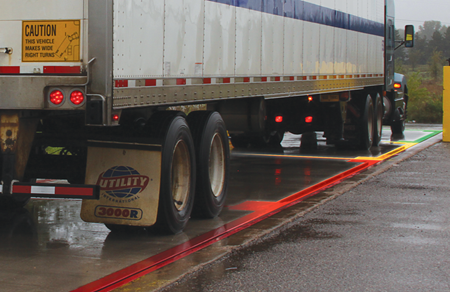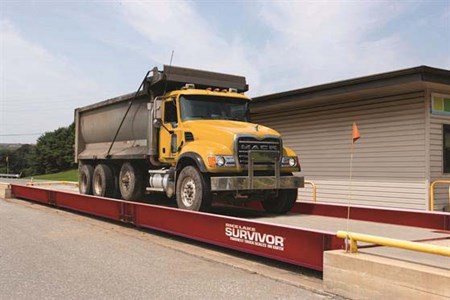Is the website displaying in the correct language? Please confirm or select a different language.
Your region has been set automatically. Please confirm or select a different region.
Truck Scale Weighbridge Design and Capacity
The structural integrity of the weighbridge is the single most important consideration in the purchase of any truck scale. A failing weighbridge results in continued problems that can only be solved with replacement.
Weighbridge Strength
One of the best ways to judge a scale’s strength and ability to withstand high-traffic volume is the weighbridge design and steel content. Ask your scale supplier to show you the advantages and disadvantages of each weighbridge design. Also, ask your scale supplier to provide the steel content of each manufacturer’s weighbridge so you can determine which scale is strong enough for your needs.
Two industry recognized terms often associated with weighbridge capacity and vehicle scale load ratings are concentrated load capacity (CLC) and dual tandem axle (DTA). These ratings define the maximum load the weighbridge is designed to support by a group of two axles with a center line spaced four feet apart and an axle width eight feet apart. A National Type Evaluation Program (NTEP) test records a truck scale loaded to CLC/DTA and the displayed weight. If the scale falls within acceptable testing tolerances, the scale has that CLC/DTA weight recorded on its Certificate of Conformance.
Closely examine each manufacturer’s truck scale specifications with your scale supplier and discuss what each specification means for your application. Note that load cell capacities do not directly correlate to the capacity of the scale, and always be mindful of the type of loads you will use on your truck scale. Depending on your average axle loads, a truck scale may need more strength to withstand fewer, heavy loads than the average scale designed for frequent, legal highway loading. If your application needs to process Legal for Trade transaction weighments, ask your scale supplier to discuss all scale options, including scales that can provide legal weights in as little as 10 pound increments.
Always discuss your Legal for Trade needs with your scale supplier and closely examine each manufacturer’s certifications to be confident your truck scale will meet your application’s needs. NTEP provides a set of procedures for the uniform testing and evaluation of weighing equipment. For more information on your region’s requirements for full scale capacity, CLC/DTA and NTEP Certification and guidelines, speak with your scale supplier and determine the best scale to meet those guidelines.
Keep Future Capacity in Mind
Ask your scale supplier to show you truck scales with a full scale capacity that exceeds the weight of a full-size loaded truck you currently use in your operation, and then discuss how heavy your trucks may weigh in the future if operations change. A high-quality scale should last 25 years or more with proper care and use. Ensuring your scale will last through changes in operational capacity is an important factor to consider before purchasing.



 My Account
My Account

